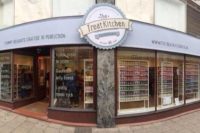Over the last 110 years, presidents have come and gone, the economy has ebbed and flowed, and inventions have revolutionized entire industries. Through it all, one thing has remained constant: The Candy Kitchen in Wilton, Iowa has served as a gathering place for generations of people in search of candy, conversation and a sense of community.
Listed in the National Register of Historic Places, the building actually has been standing since the 1800s. In its early days, it housed a variety of entities including a confectionery, a clothing store and a post office. Finally, in 1910, a permanent tenant came along. Gus Nopoulos purchased the property, added some equipment, and gave the location a name. The Candy Kitchen — a confectionery / soda fountain / ice cream parlor — was officially open for business.
Gus proudly managed the shop until the late 1940s. At that time, his son, George, and daughter-in-law, Thelma, began overseeing the operation. They continued to do so for nearly seven decades.
After George passed away in 2015, Thelma sold the business to Lynn and Brenda Ochiltree. For the first time in over a century, someone outside the Nopoulos family held the keys to The Candy Kitchen — a significant transition for a small-town destination revered as much for the familiar faces behind the counter as the items for sale.
At first glance, the Ochiltrees — owners and operators of a funeral home — may have seemed unlikely successors. However, their professional and personal background prepared them well for the unique circumstances surrounding their acquisition.
Given the nature of their previous work, they knew how to take good care of another family’s cherished legacy. As local residents with longstanding ties to the community (Lynn’s family has lived in the area since the mid-1800s), they recognized how much this particular property mattered to this particular region. The Ochiltrees promised Thelma they would do their best to make as few changes as possible to the beloved business.
Three years later, they have honored that commitment — maintaining the Candy Kitchen’s iconic interior and providing the same exceptional service that became synonymous with the Nopoulos family name over the previous hundred years. In turn, customers — from longtime locals to famous folks like Facebook’s Mark Zuckerberg — continue to flock to 310 Cedar Street to eat a sweet treat, enjoy a delicious drink, socialize with friends or tour the back of the building which now houses a one room museum chronicling The Candy Kitchen and Wilton in general.
Author Greg Forbes Siegman recently interviewed Brenda Ochiltree, and she discussed her unconventional path to the candy business, the meaning of hospitality, the responsibility that comes with taking over a century-old business, the secret to long-term success, and why they carry so many types of candy.
Greg Forbes Siegman: What does “hospitality” mean to you?
Brenda Ochiltree: To genuinely give of yourself openly and without judgment. Giving an individual an experience they would not anticipate or expect.
Siegman: When did you first develop an appreciation for hospitality?
Ochiltree: It started at home. My parents, by their words as well as their example, instilled in us that you treat people as you would want to be treated.
Siegman: How would you describe Wilton?
Ochiltree: Small town, big hearts.
Siegman: Given the smaller pool of potential customers than you’d find in a big city, is there a greater need for you to provide exceptional service in order to succeed?
Ochiltree: I feel it is the same for any business in any town, big or small. If you provide bad service, it will eventually catch up with you.
Siegman: Before buying The Candy Kitchen, you and your husband worked in another industry [running a funeral home]. What led you two to take such a big leap?
Ochiltree: One of the biggest reasons was to keep the memory alive of what the previous owners, the Nopoulos family, created and maintained. We also wanted to do it for Wilton – to make sure The Candy Kitchen stayed here and in operation.
Siegman: Has your prior work experience proven helpful, even though it took place in a different setting?
Ochiltree: Yes – because customer service is customer service, whether it takes place in a sad situation or a happy one. Making a person feel as if they are the only person that matters is something that is universal.
Siegman: Taking over a business with so much history, did you feel a sense of pride or pressure?
Ochiltree: A definite sense of pride. This business is such a treasure.
Siegman: What do you think is the secret to such sustained success?
Ochiltree: Being present, listening and doing your job.
Siegman: Given The Candy Kitchen’s longevity, you have customers of all different ages. Does that impact what candy you sell?
Ochiltree: We sell more than 80 different candies to ensure we have items that are popular with people of any generation. We have nostalgic candy such as Chick-O-Stick from Atkinson Candy Co. and Razzles from Concord Confections. The younger generation tends to gravitate to sour candy such as Sour Punch Rainbow Straws from American Licorice Co. and Quick Blast Sour Candy Spray from Kidsmania. Pop Rocks are popular with all ages. We also sell many different chocolates, which we purchase in bulk and then repackage here. Triple Dipped Malted Milk Balls and Milk Chocolate English Toffee with Sea Salt are top sellers. So, we have something for everyone.
Siegman: What have you learned during these first three years?
Ochiltree: People really love feeling a connection. Memories are very important to people, and that is why they come back — to relive their childhood or to relive a memory they had here on a previous trip. Meeting those people and having conversations with them is one of my favorite parts of this job.
Siegman: What are your future goals for The Candy Kitchen?
Ochiltree: Our daily goal is to serve customers with excellence and tell The Candy Kitchen’s story. Within our power and our financial means, our long-term goal is to continue to keep everything here as it was — to respect the Nopoulos family’s hard work and dedication to this historic business.








